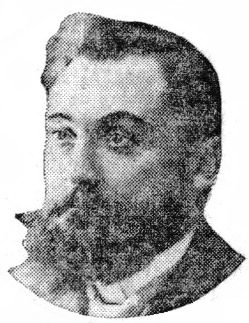Pierre Biétry facts for kids
Pierre Biétry (born May 9, 1872 – died December 3, 1918) was a French political leader and a supporter of workers' unions. He first believed in socialism, which focuses on equality and community ownership, but later changed his views to support more conservative ideas. He was a key figure in a movement called "Yellow Socialism," which some people see as an early form of fascism, a type of government where a strong leader or party controls everything.
Pierre Biétry was also the grandfather of journalist Pierre Salinger, who later became a press secretary for the White House in the United States.
Early Life and Socialist Ideas
Pierre Biétry was born in a place called Fêche-l'Église. When he was 13, he moved to Algeria and lived there for four years before coming back home to France. After returning, he joined the French Workers' Party (POF), which was a socialist political group. He was even praised in their newspaper, Le Socialiste, for his hard work in the Franche-Comté region. For a while, he also worked with followers of another socialist leader named Jules Guesde.
Between 1898 and 1901, Pierre Biétry was very active in several worker strikes. He even led a large march of workers in Paris in 1899, showing his dedication to improving workers' lives.
Changing Political Views
Around 1900, Pierre Biétry started to disagree with some socialist ideas. He didn't like the idea of a general strike, where all workers stop working at once. He also felt disappointed that socialist efforts in France weren't achieving what he hoped. Instead, he began to believe that workers and employers should work together, rather than against each other, to help working-class people. Because of these new ideas, he left the French Workers' Party in 1900.
He started to support the idea of trade unions that focused on helping workers without being tied to a specific political party. He also believed in a system called corporatism, where unions and employers would cooperate closely. In 1902, he created his own trade union, called the Fédération nationale des jaunes de France (National Federation of Yellows of France). The next year, in 1903, he formed a political group called the National Socialist Party to support his union's goals.
At first, his new movement was not very well known. However, it gained a lot more support between 1910 and 1911. This happened after some violent actions by another large union, the Confédération générale du travail, caused many more traditional workers to leave that union and join Biétry's group. His unique way of thinking about politics and his mix of different ideas made him famous in the newspapers, which often wrote about him as a very interesting and unusual figure.
Pierre Biétry also became interested in the ideas of Édouard Drumont, who held strong negative views about certain groups of people. Biétry then combined these views with his own ideas about cooperation between workers and businesses, and his opposition to large-scale capitalism. Surprisingly, his "Yellows" movement gained support from well-known conservative figures like Victor Henri Rochefort and Paul Déroulède. They liked Biétry's strong patriotism (love for his country) and his other views. For a short time, he even had the support of Action Française, another political group. However, Biétry had a very strong personality, and he wanted to lead his own movement, so this partnership didn't last long. In 1906, he was elected to the French Parliament in the election.
Later Years
Pierre Biétry's time as a major political influence did not last very long. Soon, another leader named Charles Maurras and his followers became the main focus of political activity on the right side of French politics. Biétry's "Les Jaunes" movement held its last big meeting in 1909. He decided not to run for Parliament again in the 1910 election. He passed away in Saigon in 1918.
Images for kids
 | Stephanie Wilson |
 | Charles Bolden |
 | Ronald McNair |
 | Frederick D. Gregory |



